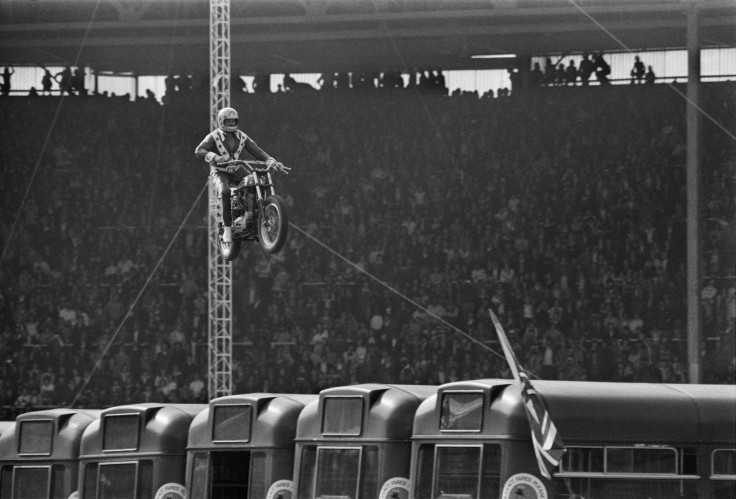Evel Knievel museum opens, honouring legendary daredevil
Pop culture icon of the 1970s gets building dedicated to his exploits.

A new Kansas museum is giving enthusiasts of late motorcycle daredevil Evel Knievel a jump on appreciating his death-defying, bone-breaking exploits.
The $5m, 13,000-square-foot homage to the hard-living man who became a global pop icon in the 1970s with rocket-powered and motorbike stunts has launched in Topeka, of all places.
As president of the two-story, nonprofit shrine attached to his Historic Harley-Davidson dealership, Mike Patterson said the Knievel memorabilia on loan from collectors includes some of the daredevil's motorcycles, leathers and helmets, and the man's restored 1974 tractor-trailer unit, dubbed "Big Red".
The museum also features a virtual reality motorcycle jump, an interactive that shows Knievel's actual X-rays and the stunts that resulted in those fractures, and an exhibit in which visitors select their own variables in planning a virtual jump, right down to the ramp angle, speed and whether they want to make it over cars, trucks or sharks.
Knievel's Kansas ties include that he traced his career choice to the time he saw George "Joie" Chitwood's Auto Daredevil Show at age 8. Chitwood, who died in 1988, got his racing start in Kansas — the state that also accounted for many Knievel hired for his crew.
To Patterson, the museum honoring Knievel — the Montana native who died of natural causes in 2007 at the age of 69 — celebrates "just how popular he was."
"The museum really overwhelms you with how much press he got, how many jumps he did and the amount of work he put in," Patterson told The Associated Press on Wednesday, a day after the museum's ribbon-cutting ceremony. A grand opening is planned for the end of June at the museum, which Patterson said was largely privately financed but received an $88,000 state grant and a commitment of $300,000 from the city over the next dozen years.
"If you do your diligence and read everything [in the museum], it's a three- to four-hour journey," Patterson added. "Honestly, it'd be virtually impossible to have another place like this because there's a finite amount of Knievel items, and most of them are here."
Immortalised in Washington's Smithsonian Institution as "America's Legendary Daredevil," the tall, thin man born Robert Craig Knievel — always garbed in patriotic, star-studded red, white and blue — was best known for an ill-fated 1974 attempt to jump the Snake River Canyon in Idaho on a rocket-powered "Skycycle," and a spectacular crash at Caesar's Palace in Las Vegas. He suffered dozens of broken bones before retiring in 1980.
After that, Knievel made a good living selling autographs and endorsing products. Thousands flocked to his copper-mining hometown of Butte, Montana, every year for "Evel Knievel Days."
"They started out watching me bust my ass, and I became part of their lives," Knievel once said. "People wanted to associate with a winner, not a loser. They wanted to associate with someone who kept trying to be a winner."
Knievel, who began his daredevil career in 1965, steadily increased the length of the jumps until, on New Year's Day 1968, he was nearly killed when he jumped 151 feet across the fountains in front of Caesar's Palace. He cleared the fountains but the crash landing put him in a coma for a month.
© Copyright IBTimes 2024. All rights reserved.






